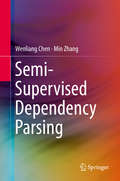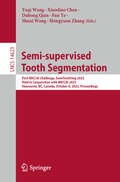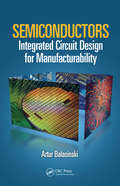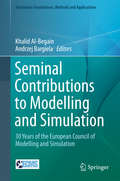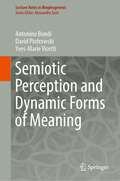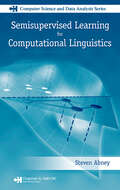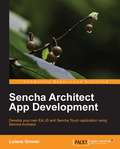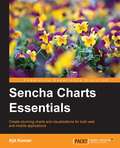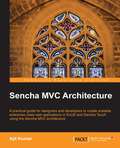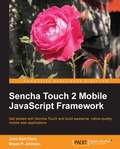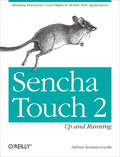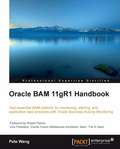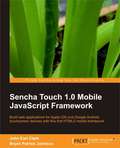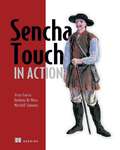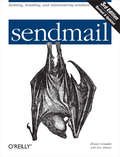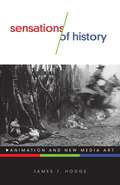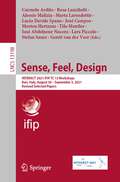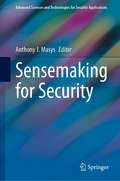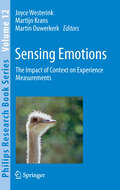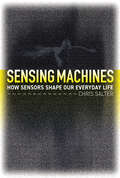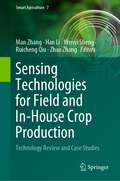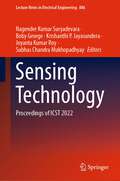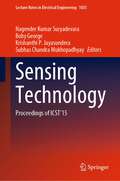- Table View
- List View
Semi-Supervised Dependency Parsing
by Min Zhang Wenliang ChenThis book presents a comprehensive overview of semi-supervised approaches to dependency parsing. Having become increasingly popular in recent years, one of the main reasons for their success is that they can make use of large unlabeled data together with relatively small labeled data and have shown their advantages in the context of dependency parsing for many languages. Various semi-supervised dependency parsing approaches have been proposed in recent works which utilize different types of information gleaned from unlabeled data. The book offers readers a comprehensive introduction to these approaches, making it ideally suited as a textbook for advanced undergraduate and graduate students and researchers in the fields of syntactic parsing and natural language processing.
Semi-supervised Tooth Segmentation: First MICCAI Challenge, SemiToothSeg 2023, Held in Conjunction with MICCAI 2023, Vancouver, BC, Canada, October 8, 2023, Proceedings (Lecture Notes in Computer Science #14623)
by Fan Ye Shuai Wang Yaqi Wang Xiaodiao Chen Dahong Qian Hongyuan ZhangThis book constitutes the proceedings of the First MICCAI 2023 Challenge on Semi-supervised Tooth Segmentation, SemiToothSeg 2023, held in Conjunction with MICCAI 2023, in Vancouver, BC, Canada, on October 8, 2023. The 16 full papers presented in this book were carefully reviewed and selected from 64 submissions. The papers were written by participants in the STS challenge to describe their solutions for automatic teeth segmentation using the offcial training dataset released for this purpose. In general, this challenge aims to promote the development of the teeth segmentation in panoramic X-ray images and dental CBCT scans.
Semiconductors: Integrated Circuit Design for Manufacturability (Devices, Circuits, and Systems)
by Artur BalasinskiBecause of the continuous evolution of integrated circuit manufacturing (ICM) and design for manufacturability (DfM), most books on the subject are obsolete before they even go to press. That’s why the field requires a reference that takes the focus off of numbers and concentrates more on larger economic concepts than on technical details. Semiconductors: Integrated Circuit Design for Manufacturability covers the gradual evolution of integrated circuit design (ICD) as a basis to propose strategies for improving return-on-investment (ROI) for ICD in manufacturing. Where most books put the spotlight on detailed engineering enhancements and their implications for device functionality, in contrast, this one offers, among other things, crucial, valuable historical background and roadmapping, all illustrated with examples. Presents actual test cases that illustrate product challenges, examine possible solution strategies, and demonstrate how to select and implement the right one This book shows that DfM is a powerful generic engineering concept with potential extending beyond its usual application in automated layout enhancements centered on proximity correction and pattern density. This material explores the concept of ICD for production by breaking down its major steps: product definition, design, layout, and manufacturing. Averting extended discussion of technology, techniques, or specific device dimensions, the author also avoids the clumsy chapter architecture that can hinder other books on this subject. The result is an extremely functional, systematic presentation that simplifies existing approaches to DfM, outlining a clear set of criteria to help readers assess reliability, functionality, and yield. With careful consideration of the economic and technical trade-offs involved in ICD for manufacturing, this reference addresses techniques for physical, electrical, and logical design, keeping coverage fresh and concise for the designers, manufacturers, and researchers defining product architecture and research programs.
Seminal Contributions to Modelling and Simulation
by Khalid Al-Begain Andrzej BargielaMarking the 30th anniversary of the European Conference on Modelling and Simulation (ECMS), this inspirational text/reference reviews significant advances in the field of modelling and simulation, as well as key applications of simulation in other disciplines. The broad-ranging volume presents contributions from a varied selection of distinguished experts chosen from high-impact keynote speakers and best paper winners from the conference, including a Nobel Prize recipient, and the first president of the European Council for Modelling and Simulation (also abbreviated to ECMS). This authoritative book will be of great value to all researchers working in the field of modelling and simulation, in addition to scientists from other disciplines who make use of modelling and simulation approaches in their work.
Semiotic Perception and Dynamic Forms of Meaning (Lecture Notes in Morphogenesis)
by David Piotrowski Antonino Bondi Yves-Marie VisettiWhat do we mean by semiotic perception? Why should the concepts of perception and expressivity be reinterpreted within the encompassing framework of a dynamic theory of semiotic fields and forms? Can we redeploy the concept of form in such a way as to make explicit such a native solidarity (‘chiasmatic’ would have said Merleau-Ponty) between perception, praxis and expression -- and first and foremost in the activity of language, right to the heart of the life of the social and speaking animal that we are? What then would be the epistemological and ontological consequences, and how might this affect the way we describe semiolinguistic forms? This book aims to provide answers to these questions by opening up avenues of research on how to understand the linguistic and semiotic dimensions at work in the constitution of experience, both individual and collective.
Semisupervised Learning for Computational Linguistics (Chapman & Hall/CRC Computer Science & Data Analysis)
by Steven AbneyThe rapid advancement in the theoretical understanding of statistical and machine learning methods for semisupervised learning has made it difficult for nonspecialists to keep up to date in the field. Providing a broad, accessible treatment of the theory as well as linguistic applications, Semisupervised Learning for Computational Linguistics offer
Sencha Architect App Development
by Loiane GronerA standard tutorial-based approach for using Sencha Architect to develop applications in Ext JS and Sencha Touch.Sencha Architect App Development is for Ext JS and Sencha Touch developers that are looking to improve their productivity by using Sencha Architect for app development. Basic knowledge of Ext JS and Sencha Touch is required.
Sencha Charts Essentials
by Ajit KumarIf you are an Ext JS or Sencha Touch developer, designer, or architect who wants to build enterprise-scale data visualization capabilities using Sencha, then this book is ideal for you. You should have a knowledge of HTML, JavaScript, CSS, and Sencha Ext JS or Sencha Touch fundamentals, in particular. Some familiarity with SVG and HTML5 Canvas would be preferred, but not required.
Sencha MVC Architecture
by Ajit KumarThis is a step-by-step tutorial with plenty of example code for easier and quicker pick-up. If you are new to ExtJS or Sencha Touch, this book will help you model your application using good architectural practices so that your application is enterprise-class from day one. If you have already been building ExtJS or Sencha Touch based applications, this book will show you how to apply the client-side MVC architecture and benefit from it. It will show you how you can leverage Sencha's MVC Architecture and the Sencha Tools to manage your projects in a better way.
Sencha Touch 2 Mobile JavaScript Framework
by Bryan P. Johnson John Earl ClarkFull of explained code and enriched with screenshots, this book is the practical way to take your Sencha Touch skills to the next level.If you want to gain practical knowledge for using the Sencha Touch mobile web application framework, and you are familiar with HTML and CSS, then this book is for you. It is assumed that you know how to use touchscreens, touch events, and mobile devices such as Apple iOS and Google Android.
Sencha Touch 2 Up and Running: Building Enterprise Cross-Platform Mobile Web Applications
by Adrian KosmaczewskiLaunch into Sencha Touch 2 with this hands-on book, and quickly learn how to develop robust mobile web apps that look and behave like native applications. Using numerous code samples, author Adrian Kosmaczewski guides you every step of the way through this touchscreen-enabled JavaScript framework—from creating your first basic app to debugging, testing, and deploying a finished product. Learn how to craft user interfaces, build forms, and manage data, then deploy as either an HTML5 offline app or as a native app for Android, iOS, or Blackberry.Define classes and create instances with Sencha Touch’s object-oriented abstractionBuild user interfaces with the framework’s extensive set of high-level componentsDevelop apps that consume complex data, whether it’s stored locally or on remote serversOrganize your application code in a consistent, predictable, and maintainable wayUse Sass stylesheets to craft a personalized look and feel for your appDebug, test, and document your app with WebKit Web Inspector, Jasmine, Siesta, and JSDuckUse the Sencha Architect UI designer and IDE to simplify complex project development
Sencha Touch Cookbook
by Ajit KumarThe book is written in a cookbook style, presenting examples in the style of recipes, allowing you to go directly to your topic of interest, or follow topics throughout a chapter to gain in-depth knowledge. This book is ideal for anyone who wants to gain the practical knowledge involved in using Sencha Touch mobile web application framework to make attractive web apps for mobiles. If you have some familiarity with HTML and CSS, then this book is for you. This book will give designers the skills they need to implement their ideas, and provide developers with creative inspiration through practical examples. It is assumed that you know how to use touch screens, touch events, WebKit on mobile systems, Apple iOS, and Google Android for Mobiles.
Sencha Touch Cookbook, Second Edition
by Ajit KumarThe book is written in a Cookbook style, presenting examples in the style of recipes, allowing you to go directly to your topic of interest or follow topics throughout a chapter to gain in-depth knowledge.Sencha Touch Cookbook (2nd edition) is great for developers who are new to Sencha Touch and who are looking to get a good hold on what the Sencha Touch framework offers and how to use it to build a great touch-based mobile application running on different platforms. It is assumed that you will have some experience in HTML, CSS, DOM, and JavaScript. To truly appreciate the framework capability and take full advantage of the book, readers are expected to have one or more mobile devices.
Sencha Touch Mobile JavaScript Framework
by Ssvv NarasimhaThis book is a step-by-step tutorial aimed at beginners to Sencha Touch. There is ready sample code explained with essential screenshots for better and quicker understanding. This book is ideal for anyone who wants to gain the practical knowledge involved in using Sencha Touch mobile web application framework to make attractive web apps for mobiles. If you have some familiarity with HTML and CSS, then this book is for you. This book will give designers the skills they need to implement their ideas, and provides developers with creative inspiration through practical examples. It is assumed that you know how to use touch screens, touch events, WebKit on mobile systems, Apple iOS, and Google Android for Mobiles.
Sencha Touch in Action
by Jesus Garcia Anthony De Moss Mitchell SimoensSummarySencha Touch in Action is the definitive guide to developing applications with Sencha Touch. You'll begin with basic design principles for building great mobile applications, and then explore the features of Sencha Touch that bring those ideas to life. You'll learn how and why objects operate in the framework as you work through several real-world examples. This book also promotes the emerging best practices for mobile web development, from widget implementation to developing an application with the Sencha Touch MVC framework. Updated for Sencha Touch 2.About the TechnologyThe Sencha Touch framework makes it easy to build cross-platform mobile apps using HTML5 and JavaScript. It offers numerous features that mimic native mobile APIs and an MVC architecture that feels right at home for application developers. So you get the power and richness of native apps and the convenience of standard web tools.About this BookSencha Touch in Action is a complete guide for developers of native-quality mobile Sencha Touch applications. You'll explore real-world examples as you master this impressive framework from the ground up. The book shows you good practices for mobile web development, from widget implementation to the structure of MVC applications.The book requires basic JavaScript skills. It assumes no experience with Sencha Touch or Ext JS.What's InsideCovers Sencha Touch 2Build on your existing web dev skillsCreate mobile web apps that feel like native appsExtend enterprise apps to mobile clientsPurchase of the print book includes a free eBook in PDF, Kindle, and ePub formats from Manning Publications.About the AuthorsJay Garcia is a popular speaker, Sencha community advocate, and author of Ext JS in Action. Anthony De Moss is a professional web and mobile developer. Mitchell Simoens is a Sencha developer supporting the Sencha Touch and Ext JS products.Table of ContentsPART 1 INTRODUCTION TO SENCHA TOUCHIntroducing Sencha TouchUsing Sencha Touch for the first timeSencha Touch foundationsPART 2 BUILDING MOBILE USER INTERFACESMastering the building blocksToolbars, buttons, and docked itemsGetting the user's attentionData stores and viewsWorking with formsMaps and mediaPART 3 CONSTRUCTING AN APPLICATIONClass system foundationsBuilding Sencha Touch applications
Send: The Essential Guide to Email for Office and Home
by David Shipley Will SchwalbeThe hows and whys of using email, and how to communicate effectively.
Sendmail
by Bryan CostalesReliable, flexible, and configurable enough to solve the mail routing needs of any web site, sendmail has withstood the test of time, but has become no less daunting in its complexity. Even the most experienced system administrators have found it challenging to configure and difficult to understand. For help in unraveling its intricacies, sendmail administrators have turned unanimously to one reliable source--the bat book, or sendmail by Bryan Costales and the creator of sendmail, Eric Allman. Now in its third edition, this best-selling reference will help you master the most demanding version of sendmail yet.The new edition of sendmail has been completely revised to cover sendmail 8.12--a version with more features and fundamental changes than any previous version of the Unix-based email routing program. Because the latest version of sendmail differs so significantly from earlier versions, a massive rewrite of this best-selling reference was called for.The book begins by guiding you through the building and installation of sendmail and its companion programs, such as vacation and makemap. These additional programs are pivotal to sendmail's daily operation. Next, you'll cover the day-to-day administration of sendmail. This section includes two entirely new chapters, "Performance Tuning" to help you make mail delivery as efficient as possible, and "Handling Spam" to deal with sendmail's rich anti-spam features. The next section of the book tackles the sendmail configuration file and debugging. And finally, the book wraps up with five appendices that provide more detail about sendmail than you may ever need. Altogether, versions 8.10 through 8.12 include dozens of new features, options, and macros, and this greatly expanded edition thoroughly addresses each, and provides and advance look at sendmail version 8.13 (expected to be released in 2003).With sendmail, Third Edition in hand, you will be able to configure this challenging but necessary utility for whatever needs your system requires. This much anticipated revision is essential reading for sendmail administrators.
Sensations of History: Animation and New Media Art (Electronic Mediations #57)
by James J. HodgeA phenomenological investigation into new media artwork and its relationship to history What does it mean to live in an era of emerging digital technologies? Are computers really as antihistorical as they often seem? Drawing on phenomenology&’s investigation of time and history, Sensations of History uses encounters with new media art to inject more life into these questions, making profound contributions to our understanding of the digital age in the larger scope of history.Sensations of History combines close textual analysis of experimental new media artworks with in-depth discussions of key texts from the philosophical tradition of phenomenology. Through this inquiry, author James J. Hodge argues for the immense significance of new media art in examining just what historical experience means in a digital age. His beautiful, aphoristic style demystifies complex theories and ideas, making perplexing issues feel both graspable and intimate.Highlighting underappreciated, vibrant work in the fields of digital art and video, Sensations of History explores artists like Paul Chan, Phil Solomon, John F. Simon, and Barbara Lattanzi. Hodge&’s provocative interpretations, which bring these artists into dialogue with well-known works, are perfect for scholars of cinema, media studies, art history, and literary studies. Ultimately, Sensations of History presents the compelling case that we are not witnessing the end of history—we are instead seeing its rejuvenation in a surprising variety of new media art.
Sense, Feel, Design: INTERACT 2021 IFIP TC 13 Workshops, Bari, Italy, August 30 – September 3, 2021, Revised Selected Papers (Lecture Notes in Computer Science #13198)
by José Abdelnour Nocera Stefan Sauer Alessio Malizia Carmelo Ardito José Campos Rosa Lanzilotti Marta Larusdottir Lucio Davide Spano Morten Hertzum Tilo Mentler Lara Piccolo Gerrit van der VeerThis book contains a series of revised papers selected from 7 workshops organized by 18th IFIP TC 13 International Conference on Human-Computer Interaction, INTERACT 2021, which was held in September 2021 in Bari, Italy. The 15 papers included in this volume were carefully reviewed and selected from 30 submissions. They show the design of interactive technologies addressing one or more United Nations' Sustainable Development Goals, to deal with evolving contexts of use in today’s and future application domains and its influence on human-centered socio-technical system design and devel-opment practice, share educational resources and approaches to support the process of teaching and learning HCI Engineering (HCI-E), share educational resources and approaches to support the process of teaching and learning HCI Engineering (HCI-E), and address and discuss geopolitical issues in Human-Computer Interaction as a field of knowledge and practice.
Sensemaking for Security (Advanced Sciences and Technologies for Security Applications)
by Anthony J. MasysThis book presents sensemaking strategies to support security planning and design. Threats to security are becoming complex and multifaceted and increasingly challenging traditional notions of security. The security landscape is characterized as ‘messes’ and ‘wicked problems’ that proliferate in this age of complexity. Designing security solutions in the face of interconnectedness, volatility and uncertainty, we run the risk of providing the right answer to the wrong problem thereby resulting in unintended consequences. Sensemaking is the activity that enables us to turn the ongoing complexity of the world into a “situation that is comprehended explicitly in words and that serves as a springboard into action” (Weick, Sutcliffe, Obstfeld, 2005). It is about creating an emerging picture of our world through data collection, analysis, action, and reflection. The importance of sensemaking to security is that it enables us to plan, design and act when the world as we knew it seems to have shifted. Leveraging the relevant theoretical grounding and thought leadership in sensemaking, key examples are provided, thereby illustrating how sensemaking strategies can support security planning and design. This is a critical analytical and leadership requirement in this age of volatility, uncertainty, complexity and ambiguity that characterizes the security landscape. This book is useful for academics, graduate students in global security, and government and security planning practitioners.
Sensing Emotions
by Martijn Krans Martin Ouwerkerk Joyce WesterinkIn the future, products and machines will know how we feel and how to adapt to those feelings. This book analyzes the influence of specific everyday situations and contexts on the emotional state of people and ways this will impact future user experience.
Sensing Machines: How Sensors Shape Our Everyday Life
by Chris SalterHow we are tracked, surveilled, tantalized, and seduced by machines ranging from smart watches and Roombas to immersive art installations.Sensing machines are everywhere in our world. As we move through the day, electronic sensors and computers adjust our thermostats, guide our Roombas, count our steps, change the orientation of an image when we rotate our phones. There are more of these electronic devices in the world than there are people—in 2020, thirty to fifty billion of them (versus 7.8 billion people), with more than a trillion expected in the next decade. In Sensing Machines, Chris Salter examines how we are tracked, surveilled, tantalized, and seduced by machines ranging from smart watches and mood trackers to massive immersive art installations. Salter, an artist/scholar who has worked with sensors and computers for more than twenty years, explains that the quantification of bodies, senses, and experience did not begin with the surveillance capitalism practiced by Facebook, Amazon, Netflix, and Google but can be traced back to mathematical and statistical techniques of the nineteenth century. He describes the emergence of the &“sensed self,&” investigating how sensor technology has been deployed in music and gaming, programmable and immersive art environments, driving, and even eating, with e-tongues and e-noses that can taste and smell for us. Sensing technology turns our experience into data; but Salter&’s story isn&’t just about what these machines want from us, but what we want from them—new sensations, the thrill of the uncanny, and magic that will transport us from our daily grind.
Sensing Technologies for Field and In-House Crop Production: Technology Review and Case Studies (Smart Agriculture #7)
by Zhao Zhang Man Zhang Han Li Wenyi Sheng Ruicheng QiuThis book focuses on state-of-the-art sensing and automation technologies for field crops and in-house product production and provides a lot of innovative knowledge on image processing, AI algorithms and applications in agriculture, and robotics. This book provides undergraduate or graduate students with take-away knowledge for unmanned agricultural production, including but not limited to corn disease detection, wheat head detection and counting, and soil nutrient condition monitoring. The first three chapters focus on reviewing plant phenotyping sensing technology and robotics and soil nutrient monitoring, followed by in-house crop sensing robotics. Then two case studies on corn and the other two case studies on wheat are presented.
Sensing Technology: Proceedings of ICST 2022 (Lecture Notes in Electrical Engineering #886)
by Subhas Chandra Mukhopadhyay Krishanthi P. Jayasundera Boby George Joyanta Kumar Roy Nagender Kumar SuryadevaraThis book gathers the latest advances, innovations, and applications in the field of sensing technology, as presented by international researchers and engineers at the 14th International Conference on Sensing Technology (ICST), held in Chennai, India on January 17-19, 2022. Contributions include a wide range of topics such as: vision sensing, sensor signal processing, sensors phenomena and modelling, sensor characterization, smart sensors and sensor fusion, electromagnetic, chemical and physical sensors, electronic nose technology, biosensors, nano sensors, wireless sensors and WSN, Internet of Things, optical sensors, sensor arrays, intelligent sensing, Internet-based and remote data acquisition. The contributions, which were selected by means of a rigorous international peer-review process, present a wealth of exciting ideas that will open novel research directions and foster multidisciplinary collaboration among different specialists.
Sensing Technology: Proceedings of ICST'15 (Lecture Notes in Electrical Engineering #1035)
by Subhas Chandra Mukhopadhyay Krishanthi P. Jayasundera Boby George Nagender Kumar SuryadevaraThis book gathers the latest advances, innovations, and applications in the field of sensing technology, as presented by international researchers and engineers at the 15th International Conference on Sensing Technology (ICST), held in Sydney, Australia on December 5–7, 2022. Contributions include a wide range of topics such as: vision sensing, sensor signal processing, sensors phenomena and modelling, sensor characterization, smart sensors and sensor fusion, electromagnetic, chemical and physical sensors, electronic nose technology, biosensors, nano sensors, wireless sensors and WSN, Internet of Things, optical sensors, sensor arrays, intelligent sensing, Internet-based and remote data acquisition. The contributions, which were selected by means of a rigorous international peer-review process, present a wealth of exciting ideas that will open novel research directions and foster multidisciplinary collaboration among different specialists.
